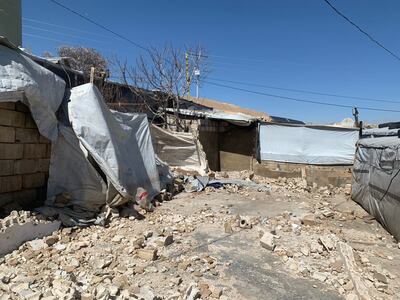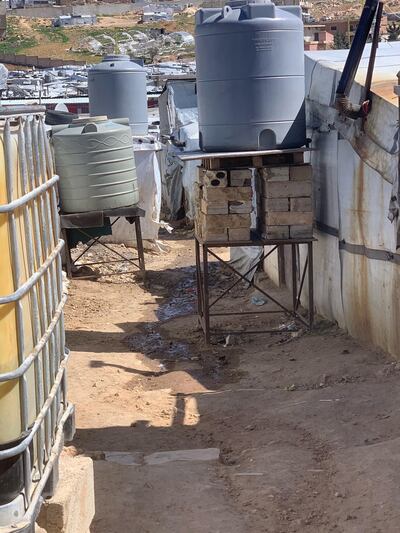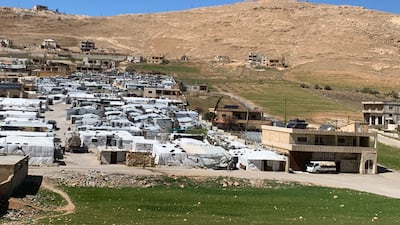Wind is pounding the camps where Syrian refugees live in the Lebanese town of Arsal, straining tent walls held down by concrete blocks.
Inside, where flimsy cardboard walls shake and ripped tent sheets billow, the roar of the wind only multiplies in the small rooms where families live.
A predominantly Sunni Muslim town that sits in the hills and mountains that border Syria, Arsal lies almost in a rocky crater, surrounded by hills that show the remnants of winter snow.
It is a bleak scene at the best of times, but the reportedly 77,000 refugees there — they make up about two-thirds of Arsal’s residents — are living through a difficult Ramadan.
Regardless of which of the many scattered camps they live in, the story is the same: a slashing in aid and financial support and the wider economic crisis in Lebanon, among a litany of other issues, have worsened the situation.
Abu Ali Rifai, a leader in one of the Arsal camps, has been without gas for days as he struggles to pay for expenses including rent and water transport.
“We still haven’t figured what’s going to be for Iftar tonight. We’re not sure what to cook — we cannot cook,” he told The National.
“We were just talking about it, but we didn’t get the chance to even think about it. Because even before thinking about what to eat, we are thinking about what to do with the tents that have been falling apart because of the wind. Since the morning, we’ve been occupied with that,” said Mr Rifai, who has been in Lebanon for 12 years and is from the Qalamoun mountains.
Given the lack of food, he fears some children in the camps are becoming too skinny and risk malnutrition. Many are relying on mainly bread diet, the price of which itself is increasing amid the rampant inflation in Lebanon.
“My child was asking me what are we eating today? I told him I didn’t get a chance to think about it yet because of the tent issue. What can I tell a child asking me what to eat?”
His story is similar to many in Arsal’s refugee camps, where there always seems to be problems.
Last autumn cholera broke out in the camps, while skin infections are increasing.
Flooding is common, and families are forced to burn unsuitable and potentially dangerous materials to stay warm as the cold lingers high up in the mountains.
UN agencies said that about 90 per cent of Syrian refugee families in Lebanon need assistance to survive.
Lutfi, the leader of another Arsal camp, said people are rationing or rely on each other.
This comes amid the background of the ever present rhetoric from some in Lebanon who resent the presence of Syrian refugees. The latter number more than one million in the country of about six million.
Mahmoud Youssef said he fled his home country for safety but now finds himself in a worse situation in Arsal.
The camp was recently flooded with sewage, while one tent was destroyed by the wind.
Mr Youssef has a wound on his head from a tent collapsing on him as he tried to fix it. He complains about the increased cost of buying water.
“What can we say? There’s no food to eat, no water to drink,” he said with tears in his eyes.
“I don’t have food to eat during Ramadan,” said Mr Youssef, who has been in Arsal since 2014.
WHAT IS A BLACK HOLE?
1. Black holes are objects whose gravity is so strong not even light can escape their pull
2. They can be created when massive stars collapse under their own weight
3. Large black holes can also be formed when smaller ones collide and merge
4. The biggest black holes lurk at the centre of many galaxies, including our own
5. Astronomers believe that when the universe was very young, black holes affected how galaxies formed
THE BIO
Bio Box
Role Model: Sheikh Zayed, God bless his soul
Favorite book: Zayed Biography of the leader
Favorite quote: To be or not to be, that is the question, from William Shakespeare's Hamlet
Favorite food: seafood
Favorite place to travel: Lebanon
Favorite movie: Braveheart
SPECS
Nissan 370z Nismo
Engine: 3.7-litre V6
Transmission: seven-speed automatic
Power: 363hp
Torque: 560Nm
Price: Dh184,500
ENGLAND SQUAD
Team: 15 Mike Brown, 14 Anthony Watson, 13 Ben Te'o, 12 Owen Farrell, 11 Jonny May, 10 George Ford, 9 Ben Youngs, 1 Mako Vunipola, 2 Dylan Hartley, 3 Dan Cole, 4 Joe Launchbury, 5 Maro Itoje, 6 Courtney Lawes, 7 Chris Robshaw, 8 Sam Simmonds
Replacements 16 Jamie George, 17 Alec Hepburn, 18 Harry Williams, 19 George Kruis, 20 Sam Underhill, 21 Danny Care, 22 Jonathan Joseph, 23 Jack Nowell
How to watch Ireland v Pakistan in UAE
When: The one-off Test starts on Friday, May 11
What time: Each day’s play is scheduled to start at 2pm UAE time.
TV: The match will be broadcast on OSN Sports Cricket HD. Subscribers to the channel can also stream the action live on OSN Play.
SUE%20GRAY'S%20FINDINGS
%3Cp%3E%22Whatever%20the%20initial%20intent%2C%20what%20took%20place%20at%20many%20of%20these%20gatherings%20and%20the%3Cbr%3Eway%20in%20which%20they%20developed%20was%20not%20in%20line%20with%20Covid%20guidance%20at%20the%20time.%3C%2Fp%3E%0A%3Cp%3E%22Many%20of%20these%20events%20should%20not%20have%20been%20allowed%20to%20happen.%20It%20is%20also%20the%20case%20that%20some%20of%20the%3Cbr%3Emore%20junior%20civil%20servants%20believed%20that%20their%20involvement%20in%20some%20of%20these%20events%20was%20permitted%20given%20the%20attendance%20of%20senior%20leaders.%C2%A0%3C%2Fp%3E%0A%3Cp%3E%22The%20senior%20leadership%20at%20the%20centre%2C%20both%20political%20and%20official%2C%20must%20bear%20responsibility%20for%20this%20culture.%C2%A0%3C%2Fp%3E%0A%3Cp%3E%22I%20found%20that%20some%20staff%20had%20witnessed%20or%20been%20subjected%20to%20behaviours%20at%20work%20which%20they%20had%20felt%20concerned%20about%20but%20at%20times%20felt%20unable%20to%20raise%20properly.%3C%2Fp%3E%0A%3Cp%3E%22I%20was%20made%20aware%20of%20multiple%20examples%20of%20a%20lack%20of%20respect%20and%20poor%20treatment%20of%20security%20and%20cleaning%20staff.%20This%20was%20unacceptable.%22%C2%A0%3C%2Fp%3E%0A
Huddersfield Town permanent signings:
- Steve Mounie (striker): signed from Montpellier for £11 million
- Tom Ince (winger): signed from Derby County for £7.7m
- Aaron Mooy (midfielder): signed from Manchester City for £7.7m
- Laurent Depoitre (striker): signed from Porto for £3.4m
- Scott Malone (defender): signed from Fulham for £3.3m
- Zanka (defender): signed from Copenhagen for £2.3m
- Elias Kachunga (winger): signed for Ingolstadt for £1.1m
- Danny WIlliams (midfielder): signed from Reading on a free transfer
More on animal trafficking
The specs
Engine: 2.0-litre four-cylinder turbo
Power: 268hp at 5,600rpm
Torque: 380Nm at 4,800rpm
Transmission: CVT auto
Fuel consumption: 9.5L/100km
On sale: now
Price: from Dh195,000
Stage 5 results
1 Tadej Pogacar (SLO) UAE Team Emirates 3:48:53
2 Alexey Lutsenko (KAZ) Astana Pro Team -
3 Adam Yates (GBR) Mitchelton-Scott -
4 David Gaudu (FRA) Groupama-FDJ 0:00:04
5 Ilnur Zakarin (RUS) CCC Team 0:00:07
General Classification:
1 Adam Yates (GBR) Mitchelton-Scott 20:35:04
2 Tadej Pogacar (SlO) UAE Team Emirates 0:01:01
3 Alexey Lutsenko (KAZ) Astana Pro Team 0:01:33
4 David Gaudu (FRA) Groupama-FDJ 0:01:48
5 Rafał Majka (POL) Bora-Hansgrohe 0:02:11
If you go
The flights
Etihad flies direct from Abu Dhabi to San Francisco from Dh5,760 return including taxes.
The car
Etihad Guest members get a 10 per cent worldwide discount when booking with Hertz, as well as earning miles on their rentals. A week's car hire costs from Dh1,500 including taxes.
The hotels
Along the route, Motel 6 (www.motel6.com) offers good value and comfort, with rooms from $55 (Dh202) per night including taxes. In Portland, the Jupiter Hotel (https://jupiterhotel.com/) has rooms from $165 (Dh606) per night including taxes. The Society Hotel https://thesocietyhotel.com/ has rooms from $130 (Dh478) per night including taxes.
More info
To keep up with constant developments in Portland, visit www.travelportland.com. Good guidebooks include the Lonely Planet guides to Northern California and Washington, Oregon & the Pacific Northwest.
MATCH INFO
Champions League quarter-final, first leg
Ajax v Juventus, Wednesday, 11pm (UAE)
Match on BeIN Sports




